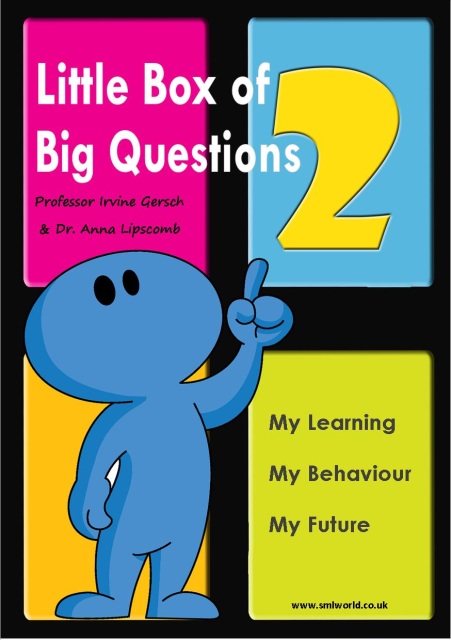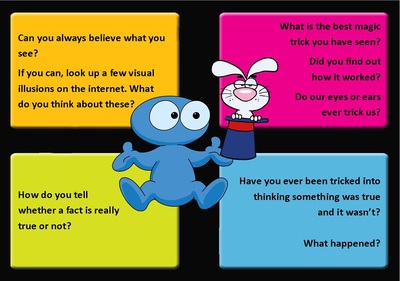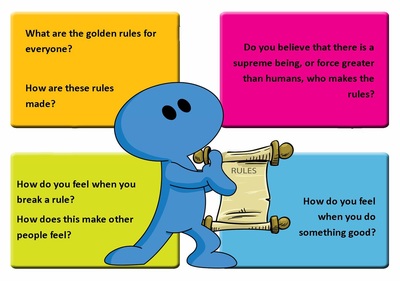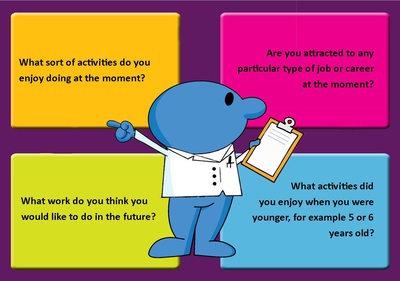- Feelings & Emotions Secondary
- >
- Little Box of Big Questions 2: My Learning, My Behaviour & My Future
SKU:
Little Box of Big Questions 2: My Learning, My Behaviour & My Future
£24.99
£24.99
Unavailable
per item
By Professor Irvine Gersch and Dr Anna Lipscomb
These cards aim to stimulate philosophical conversations with children and young people about some big, and very big questions about life. They aim to help children and young people discover links between their attitudes, learning and behaviour with a view to thinking about their plans in school and in life, and longer term ideas about their future.
Aim and purpose
These cards are intended to provide prompts and a stimulus to a meaningful and stimulating, positive and enjoyable conversation which helps us to understand the views of children and young people about themselves, their relationships, their lives and their beliefs.
These cards aim to stimulate philosophical conversations with children and young people about some big, and very big questions about life. They aim to help children and young people discover links between their attitudes, learning and behaviour with a view to thinking about their plans in school and in life, and longer term ideas about their future.
These cards are intended to provide prompts and a stimulus to a meaningful and stimulating, positive and enjoyable conversation which helps us to understand the views of children and young people about themselves, their relationships, their lives and their beliefs.
|
|
Philosophy
We believe that we can understand children/young people better when we listen carefully to their responses to the 'big' questions in life. This can help us understand the root of their thinking and behaviour and can give us insight into how best to support them to reach their potential. We believe that children/young people need time, space and kindness to speak openly about the things most important to them and therefore, careful facilitation and trusted relationships are key to these conversations. Who is it for?
This resource is suitable for children and young people aged 8 to 18 years, but could be used with any individual (child, young person or adult) who may be interested in, or benefit from, engaging in conversations of this kind. It can be used individually or as part of a group and can either be facilitated by an adult or between peers. However, it is vital that children/young people taking part in the conversations have a positive and trusted relationship with the facilitator. Use the cards to: ● understand children/young people in a deep way ● benefit the child/young person’s self-development ● promote learning and behaviour in school ● help assessments under the Children and Families Act 2014 ● enable self-focussed, stimulating discussions and revealing answers ● encourage self awareness & personal reflection Age 8-18 |
A bit more about Little Box of Big Questions 2
Professor Irvine Gersch, in the School of Psychology, together with his colleague Dr Anna Lipscomb, an educational psychologist and past UEL student, have published the Little Box of Big Questions 2, My Learning My Behaviour, My Future, a box of child friendly question cards aimed to facilitate deep meaningful and philosophical conversations with children and young people (aged 8 - 18) about their mission in life, life purpose and deep motivations. The aim is to help young people think about their passions, hopes, and to encourage optimistic planning and thinking. The authors believe that we can understand children better when we listen carefully to their responses to the " big" questions in life, which can then give us insight into how best to support them to reach their potentials. Informed by several research projects carried out by UEL students, the box was published by Small World - Big Imaginations Ltd (2015), and is intended for use worldwide in schools, and by educational psychologists, parents, teachers and all those working with children and young people. It follows the successful publication of Little Box of Big Question ; Philosophical conversations with children and young people (2012).




